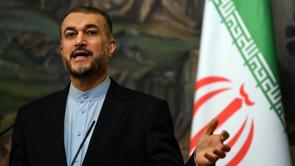 Iranian Foreign Minister Hossein Amir-Abdollahian speaks during a joint press conference with his Russian counterpart following their meeting in Moscow on Oct 6, 2021. (KIRILL KUDRYAVTSEV / POOL / AFP)
Iranian Foreign Minister Hossein Amir-Abdollahian speaks during a joint press conference with his Russian counterpart following their meeting in Moscow on Oct 6, 2021. (KIRILL KUDRYAVTSEV / POOL / AFP)
TEHRAN - Iran said Monday a "good agreement" will be within reach in the short term, if the United States and the E3 group of France, Britain and Germany show seriousness to fully honor their commitments under a 2015 nuclear deal.
Iran's Foreign Minister Hossein Amir Abdollahian made the remarks after meeting with his visiting Irish counterpart Simon Coveney in Tehran, according to official news agency IRNA.
Amir Abdollahian told reporters that "we are ready to reach a good agreement and do not welcome the Western side's shock-based approach."
Iran's Foreign Minister Hossein Amir Abdollahian stressed that Iran seeks to reach a good agreement as soon as possible as it would be better for the country, noting that such an agreement must be reached within the framework of logical negotiations and safeguard the Iranian nation's interests and rights
"Instead of displaying a shock-based behavior and playing with time and text, the Western sides are required to prove their real intention for returning to their entire commitments under the JCPOA," formally known as the Joint Comprehensive Plan of Action (JCPOA), he added.
Amir Abdollahian stressed that Iran seeks to reach a good agreement as soon as possible as it would be better for the country, noting that such an agreement must be reached within the framework of logical negotiations and safeguard the Iranian nation's interests and rights.
ALSO READ: Iran: Success of 'good nuke talks' hinges on sanctions removal
He said through the messages they sent to the Islamic republic through third countries and mediators, the Americans claim to have the goodwill to reach an agreement, but nothing tangible has happened yet on the ground proving the US goodwill in practice.
Commenting on the deadlines set by some parties for the talks to produce results, Amir Abdollahian stressed that threats and warnings by the Western sides do not determine the ending point of the negotiations or the time for achieving a good agreement, but the realities of the negotiating table and extent of the Western sides' seriousness and efforts to return to their commitments.
Meanwhile, Iranian President Ebrahim Raisi said in his meeting with Coveney later in the day that the real removal of the sanctions and respect for the rights of Iran's people are what the Islamic republic insists on in the Vienna talks.
Iran signed the JCPOA with world powers in July 2015. However, former US president Donald Trump pulled Washington out of the agreement in May 2018 and reimposed unilateral sanctions on Iran, which prompted the latter to drop some of its nuclear commitments one year later and advance its halted nuclear programs.
READ MORE: Iran says no initiative received from US in Vienna nuke talks
Since April 2021, eight rounds of talks have been held in the Austrian capital between Iran and the remaining JCPOA parties, namely Britain, China, France, Russia plus Germany, to revive the landmark deal, with the United States indirectly involved.



